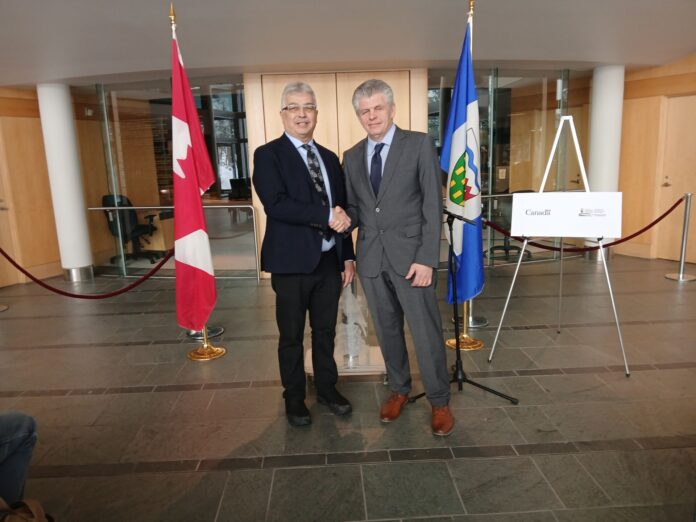Two projects in the territories are receiving nearly $7 million in funding towards building climate resiliency in the North.
The Honourable Julie Dabrusin, who is the federal minister of Environment and Climate Change, made the announcement yesterday in the city of Yellowknife.
A total of about $13.3 million in funding from the Low Carbon Economy Fund is going to five different projects in N.W.T. and Alta.
“It is up to all of us to take meaningful steps to reduce greenhouse gas emissions while positioning Canada as a global leader in the clean economy. By driving innovation and supporting climate-smart solutions, we are not only protecting our environment, we are building a strong, competitive economy that can thrive in a low-carbon future. Through investments like these, the Government of Canada is empowering communities and organizations to lead the way in securing long-term economic and environmental success,” said Minister Dabrusin in the announcement yesterday.
The Honourable Jay Macdonald, who is the minister of Environment and Climate Change in N.W.T. emphasized the role of Indigenous leadership and innovation in building clean energy and climate resiliency in the North.
“Investing in clean energy and energy efficiency for the North means a stronger, healthier future for everyone who calls this land home. Collaborative projects like these, show what’s possible when we work together to support Indigenous leadership and innovation. Together, we are building resilience, creating more opportunities for Northerners, and protecting our unique and fragile environment for generations to come,” said Minister Macdonald.
In N.W.T., a project led by Denendeh Manor GP Ltd. is receiving about $2.3 million in funding to improve energy efficiency and low carbon heating.
Darrell Beaulieu, Chief Executive Officer, Denendeh Manor GP Ltd., expressed hope and gratitude for the opportunity, referring to the project and its partnerships as “transformational.”
“On behalf of Denendeh Manor and our 27 Dene First Nation stakeholders, I want to sincerely thank Minister Dabrusin and her team at Environment and Climate Change Canada for their guidance and support in making this transformation project possible. Every year for the life of our building, this investment will eliminate our dependence on 30,000 litres of heating oil, reduce our carbon footprint by 85 tonnes of greenhouse gases, and save us over $40,000 in energy costs for heat and electricity. This project is a powerful example of federal partnerships helping Indigenous businesses and communities achieve environmental stewardship and economic success,” said Beaulieu.
A second N.W.T. based initiative, led by the Inuvialuit Regional Corporation is receiving approximately $4.6 million to supply ground-mounted solar installation kits to Inuvialuit-owned cabins in the Inuvialuit Settlement Region.
The Honourable Rebecca Alty, Minister of Crown-Indigenous Relations praised the initiatives and the move towards funding support to back both N.W.T. based projects.
“Whether it’s wildfires, rising temperatures, or extreme weather, the North faces the harsh realities of climate change every day. MP/ Minister Alty affirmed these projects will “directly support efforts to cut greenhouse gas emissions, transition to cleaner energy, and advance Canada’s climate goals through meaningful mitigation efforts,” said MP Minister Alty
The projects are being funded under the Low Carbon Economy Fund, which supports projects with a mission to reduce greenhouse gas emissions, boost clean growth, construct resilient communities and increase job opportunities for Canadians through four distinct funding streams.
Both N.W.T. initiatives are receiving funding from the Indigenous Leadership stream, which backs Indigenous-owned and Indigenous-led renewable energy, energy efficiency, and low-carbon heating projects across the country.
Yellowknife Mayor Ben Hendriksen said investments like these are critical to housing and building climate resilience in the North.
“It is great to see the federal government investing in Yellowknife housing, including through the adaptation of existing housing, to make them more energy efficient. The impacts of climate change are being felt faster in the North than anywhere else. The changes include shorter and warmer winters and hotter and longer summers that bring fires, which our city knows too well. Every dollar invested in mitigation and adaptation is a dollar well invested,” urged Mayor Hendriksen.
–





